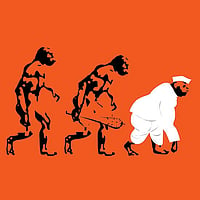Shove off Saifeena and Abhi-Ash, with your relentless, pouting narcissism and marketed excess, it’s now Hail Deepika, Angelina be thy name. After a decade of a Posh and Becks style simulated celebrityhood—of endorsements, luxury branding, manic shopping, P3 partying, splashy holidaying—it’s now about celebrity agony, Jolie style. In a televised and viral fervid week, Deepika Padukone has declared to the world her depression, despondency, despair; how she overcame it with the support of family, counsellor and psychiatrist (her mother and medical team were present on the televised interview); then came the Vogue Empowerment series, My Choice, where the actress and 98 women boom in and out of the two minute video to the beat of ‘feminist’ rap, of the right to choose, to have sex before or after marriage, or no sex at all; to marry or not; to be size zero or 15 etc. An in your face, 2-minute instant video rebellion. Until the reactions came.
Now no one is saying that depression or women’s servitude cannot be talked about or must not be eliminated. Enough has been said about the phoniness, pointlessness and banality of the Homi Adajania-directed Vogue empowerment video, but is Deepika’s television broadcast about her depression really all that path-breaking? Does a celebrity-confessional about a malady bring focus on a disorder that has so many classifications? Has Deepika’s public broadcast finally ushered in the Angelina Jolie style rush of celeb ‘intervention’ on maladies?
We’ve heard poor Bipasha Basu declare once about her osteoarthritis condition, giving her the knees of a 65-year-old, because of her fitness fetish, but no one seemed to care about her lament despite the rampant ignorance of unassisted physical training in the rush for the perfect ‘bod’. Then there was Lisa Ray writing a blog about her cancer and how stem cell therapy cured her; Salman Khan, who admitted he was diagnosed with trigeminal neuralgia, but said in Dabaang style that he was going to ‘kill it’; last week saw Amitabh Bachchan write an editorial in a national newspaper about his brush with TB even as he endorses a public health bulletin on the disease. But no one has got the celeb billing as Deepika, not because of their lesser stardom (certainly not Khan and Bachchan) but because it’s now her mission to bring awareness of this dark illness and, as she says on TV, if it can impact even one life then her outing her ailment makes it all so worthwhile. So now she’ll launch her own foundation, already registered as The Live, Love, Laugh Foundation along with a team of doctors and psychiatrists “to save people”; while on the other hand, Vogue Empower is already merchandising Amrapali charm bracelets and Mawi silver necklaces through Amazon.
It’s nobody’s business to pour scorn on Deepika’s public outpouring and her terror in dealing with the bleakness that seized her, but with this celebrity illness we are in the danger of pathologising even day-to-day stressors. Really, who hasn’t woken up one day and felt the terror of bleakness and meaninglessness? Wasn’t existential crisis fashionable once? Yes, there was weeping, theorising and questioning, but when it gave no answers or direction or peace of mind, you just had to hold on and not fall to pieces. In the ’80s, chasing the illusory fulfilment of life was like living in a Woody Allen movie; today, it’s celeb therapy culture and popping a pill.
To add to the alarm about depression, the doctor on the show then reeled off statistics that had an apocalyptical message—with 36 per cent of India’s youth suffering from depression, we are going to explode into a full-blown epidemic soon. This kind of terror mongering from a doctor creates more panic rather than looking at depression in a more rational way—the causes, kinds, reason, study, therapy, and such like.
There was a lot of tortuous praise in the show for Deepika for coming out with her ‘illness’ as there was so much stigma and disrepute associated with depression, but how true is all this? Deepika didn’t tell us about any study done where people have gone over the bend because of awkwardness, or being terrified; or for lack of awareness of the condition and treatment. Nor were we made aware of the classification of her depression disorder, what to watch out for, how not to confuse anxiety disorders with clinical depression (yes, she categorically said not to confuse sadness with depression). All we heard was everyone telling her how brave she was for coming out, for talking about it, for dealing with it, because she was a celebrity!
As Woody Allen once said, “What if everything is an illusion and nothing exists? In that case, I definitely overpaid for my carpet.”


























